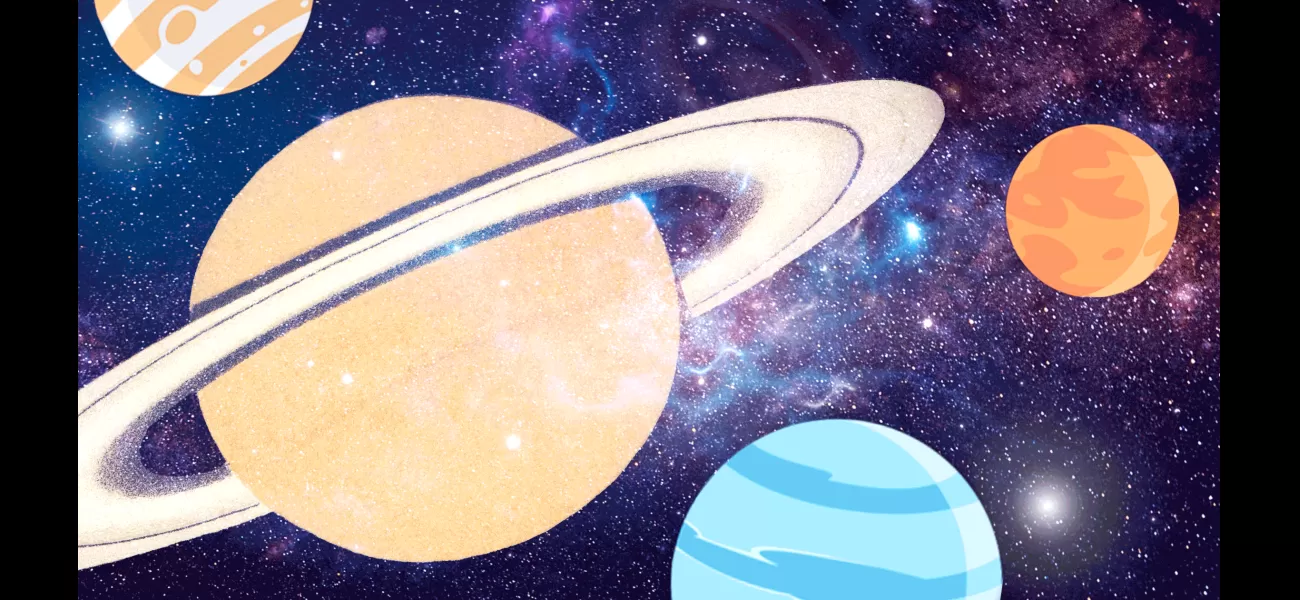It's a mystery: Here are seven explanations for why we haven't discovered any extraterrestrial life.
We're getting very restless.
February 11th 2024.

Have you ever looked up at the stars and wondered if we are truly alone in this vast universe? We certainly have. It seems like we've been searching for signs of extraterrestrial life forever, yet we still haven't found anything concrete. It's becoming tiresome, to be honest. Where are they? Where are all the aliens hiding?
But then again, it's not really fair to say they're hiding. After all, we can't really expect them to be hiding on Earth or any other planet near us. That would defeat the purpose of searching for them in the first place. With an estimated 200 billion galaxies in the universe, each with about 100 billion stars, the chances of there being other planets with life on them are quite high. And if we assume that only 1% of those stars have a planet orbiting them, that's still 200 quintillion potential new Earths out there.
But even with all these possibilities, the likelihood of a planet having the right combination of water, temperature, and chemicals for life to thrive is still quite slim. We can't deny that there should be life on at least a few hundred thousand planets, but where are they? Surely, with all these potential new Earths, at least one of them should have reached out to us by now.
It's impossible to say what form alien life could take. Maybe they're microbes, crustaceans, or even alien birds that fly with their ears like Dumbo. The possibilities are endless. But among all those planets, stars, and galaxies, there has to be some other form of intelligent life. We simply cannot be the only ones.
This brings us to the Drake equation – a famous formula that calculates the likelihood of intelligent, communicating civilizations based on various factors, such as the number of planets and the chances of life arising. But let's not get too bogged down by math. We just wanted to get a better understanding of the probability of finding other intelligent life out there.
But this is not a new conundrum. In fact, it has been given a name – the Fermi paradox. It all started in 1950 when Nobel Prize-winning physicist Enrico Fermi and his colleagues were discussing flying saucers over lunch. Fermi blurted out, "Where is everybody?" And here we are, still asking the same question.
There could be many reasons why we haven't discovered alien life yet. One theory, known as the Great Filter theory, suggests that there are many obstacles for intelligent life to overcome before they can reach a point where we can detect them. Think about it – life on Earth has gone through many stages of evolution before reaching the point where we are now. And even then, it took us a long time to develop societies, healthcare, and the ability to search for other civilizations.
According to Dr. Greg Brown, an astronomer at the Royal Observatory Greenwich, just because a planet is capable of supporting life, it doesn't necessarily mean that it will. And even if it does, the chances of that life evolving to the point of being able to communicate with other civilizations are quite slim.
Another hypothesis, known as the "Gaian bottleneck," considers how difficult it is to create the right conditions for even the most basic forms of life. Dr. Paul Byrne, an associate professor of Earth, Environmental, and Planetary Sciences, explains that it may not be difficult for life to emerge, but it's extremely difficult for it to be sustained. Earth, with its liquid water and stable conditions, is a rare gem in our solar system. Other planets, like Venus and Mars, may have had similar conditions in the past, but something went wrong, and now they are barren.
But what if we are not the only ones looking for other civilizations? Astrophysicist Amri Wande suggests that there could be many advanced extraterrestrial beings searching the universe, and they simply haven't found us yet. Maybe they don't deem us worthy of a visit because we are not intelligent enough.
It's also worth considering that maybe other civilizations have already come and gone. Perhaps they were here long before us, but due to some catastrophic event, they are no longer around. This could explain why we haven't found any signs of them.
In the end, we may never know for sure why we haven't found any other intelligent life in the universe. But one thing is for sure – the search will continue. We may be disappointed, but we won't stop looking. Who knows, maybe one day we will finally receive a "hello" from our extraterrestrial neighbors. Until then, we'll just have to keep wondering and hoping.
We've been searching for them, but where could they be hiding? To be honest, we're getting a bit tired of waiting. Where are they? Where in the world are all the aliens? Oh wait, scratch that - they're most likely not on Earth or anywhere near us, which is the whole point of our search.
According to some estimates, there are about 200 billion galaxies in the vast universe. Let's say each galaxy has about 100 billion stars. Even if only 1% of those stars had a single planet orbiting around them, that still leaves us with a whopping 200 quintillion potential new Earths to explore. And let's also assume that there's a one in a trillion chance of a planet having the right combination of water, temperature, and chemicals for life to thrive. That still adds up to hundreds of thousands of planets that could potentially harbor some form of life.
But despite these staggering numbers, we have yet to make contact with any extraterrestrial beings. Surely, with all those planets out there, one of them should have reached out to us by now, right? It's mind-boggling to think about what form alien life could take. Maybe they're microbes, crustaceans, or even flying birds that use their ears to soar through space like Dumbo. Or perhaps they're jellyfish that resemble VHS tapes or massive space dinosaurs. The possibilities are endless.
But among all those planets, stars, and galaxies, there simply has to be some other form of intelligent life out there. We can't fathom the idea of being the only ones in this vast and mysterious universe.
This brings us to the Drake equation, which is essentially a mathematical formula that calculates the likelihood of intelligent, communicating civilizations based on various factors such as the number of planets, chances of life arising, and the likelihood of that life being advanced. It's the second-most famous formula in science, right after E=MC2. So you can see why we're so invested in this search.
But this isn't a new conundrum - it's been around for quite some time and even has a name: the Fermi paradox. In 1950, Nobel Prize-winning physicist Enrico Fermi and his colleagues were having a lively discussion about flying saucers over lunch when he blurted out, "Where is everybody?" Well, we're still asking that same question today, and we decided to ask some experts why we haven't found anyone - or been found - yet.
The concept of alien life and intelligent alien life are two very different things. And unfortunately, there could be many reasons why we haven't discovered any signs of life out there. One theory, known as the Great Filter, suggests that there are so many obstacles for intelligent life to overcome that it's highly improbable for them to reach the same point as us or even beyond. Just think about our own journey - starting as life in the ocean, evolving, facing extinction multiple times, and finally reaching a point where we can communicate and search for others. It's not an easy feat.
Another hypothesis, the "Gaian bottleneck," considers how challenging it is to create the right conditions for even the most basic forms of life, never mind reaching the point we're at now. Earth has had liquid water and a habitable environment for a remarkably long time, but other planets like Venus and Mars once had similar conditions before something went wrong and made them uninhabitable. So while it may not be difficult for life to emerge, sustaining it is a whole different story.
And then there's the possibility that we're just not worth bothering with. Astrophysicist Amri Wande proposed that there could be plenty of advanced extraterrestrial beings out there, but they haven't deemed Earth worthy of a visit because we're not advanced enough ourselves. It's a sobering thought, but it's one that we must consider.
In the end, we may never know for sure why we haven't made contact with any other intelligent life forms in the universe. But one thing's for sure - the search will continue, and we'll keep asking ourselves the age-old question, "Where is everybody?" Maybe one day, we'll finally get an answer and unlock the secrets of this vast and fascinating universe.
But then again, it's not really fair to say they're hiding. After all, we can't really expect them to be hiding on Earth or any other planet near us. That would defeat the purpose of searching for them in the first place. With an estimated 200 billion galaxies in the universe, each with about 100 billion stars, the chances of there being other planets with life on them are quite high. And if we assume that only 1% of those stars have a planet orbiting them, that's still 200 quintillion potential new Earths out there.
But even with all these possibilities, the likelihood of a planet having the right combination of water, temperature, and chemicals for life to thrive is still quite slim. We can't deny that there should be life on at least a few hundred thousand planets, but where are they? Surely, with all these potential new Earths, at least one of them should have reached out to us by now.
It's impossible to say what form alien life could take. Maybe they're microbes, crustaceans, or even alien birds that fly with their ears like Dumbo. The possibilities are endless. But among all those planets, stars, and galaxies, there has to be some other form of intelligent life. We simply cannot be the only ones.
This brings us to the Drake equation – a famous formula that calculates the likelihood of intelligent, communicating civilizations based on various factors, such as the number of planets and the chances of life arising. But let's not get too bogged down by math. We just wanted to get a better understanding of the probability of finding other intelligent life out there.
But this is not a new conundrum. In fact, it has been given a name – the Fermi paradox. It all started in 1950 when Nobel Prize-winning physicist Enrico Fermi and his colleagues were discussing flying saucers over lunch. Fermi blurted out, "Where is everybody?" And here we are, still asking the same question.
There could be many reasons why we haven't discovered alien life yet. One theory, known as the Great Filter theory, suggests that there are many obstacles for intelligent life to overcome before they can reach a point where we can detect them. Think about it – life on Earth has gone through many stages of evolution before reaching the point where we are now. And even then, it took us a long time to develop societies, healthcare, and the ability to search for other civilizations.
According to Dr. Greg Brown, an astronomer at the Royal Observatory Greenwich, just because a planet is capable of supporting life, it doesn't necessarily mean that it will. And even if it does, the chances of that life evolving to the point of being able to communicate with other civilizations are quite slim.
Another hypothesis, known as the "Gaian bottleneck," considers how difficult it is to create the right conditions for even the most basic forms of life. Dr. Paul Byrne, an associate professor of Earth, Environmental, and Planetary Sciences, explains that it may not be difficult for life to emerge, but it's extremely difficult for it to be sustained. Earth, with its liquid water and stable conditions, is a rare gem in our solar system. Other planets, like Venus and Mars, may have had similar conditions in the past, but something went wrong, and now they are barren.
But what if we are not the only ones looking for other civilizations? Astrophysicist Amri Wande suggests that there could be many advanced extraterrestrial beings searching the universe, and they simply haven't found us yet. Maybe they don't deem us worthy of a visit because we are not intelligent enough.
It's also worth considering that maybe other civilizations have already come and gone. Perhaps they were here long before us, but due to some catastrophic event, they are no longer around. This could explain why we haven't found any signs of them.
In the end, we may never know for sure why we haven't found any other intelligent life in the universe. But one thing is for sure – the search will continue. We may be disappointed, but we won't stop looking. Who knows, maybe one day we will finally receive a "hello" from our extraterrestrial neighbors. Until then, we'll just have to keep wondering and hoping.
We've been searching for them, but where could they be hiding? To be honest, we're getting a bit tired of waiting. Where are they? Where in the world are all the aliens? Oh wait, scratch that - they're most likely not on Earth or anywhere near us, which is the whole point of our search.
According to some estimates, there are about 200 billion galaxies in the vast universe. Let's say each galaxy has about 100 billion stars. Even if only 1% of those stars had a single planet orbiting around them, that still leaves us with a whopping 200 quintillion potential new Earths to explore. And let's also assume that there's a one in a trillion chance of a planet having the right combination of water, temperature, and chemicals for life to thrive. That still adds up to hundreds of thousands of planets that could potentially harbor some form of life.
But despite these staggering numbers, we have yet to make contact with any extraterrestrial beings. Surely, with all those planets out there, one of them should have reached out to us by now, right? It's mind-boggling to think about what form alien life could take. Maybe they're microbes, crustaceans, or even flying birds that use their ears to soar through space like Dumbo. Or perhaps they're jellyfish that resemble VHS tapes or massive space dinosaurs. The possibilities are endless.
But among all those planets, stars, and galaxies, there simply has to be some other form of intelligent life out there. We can't fathom the idea of being the only ones in this vast and mysterious universe.
This brings us to the Drake equation, which is essentially a mathematical formula that calculates the likelihood of intelligent, communicating civilizations based on various factors such as the number of planets, chances of life arising, and the likelihood of that life being advanced. It's the second-most famous formula in science, right after E=MC2. So you can see why we're so invested in this search.
But this isn't a new conundrum - it's been around for quite some time and even has a name: the Fermi paradox. In 1950, Nobel Prize-winning physicist Enrico Fermi and his colleagues were having a lively discussion about flying saucers over lunch when he blurted out, "Where is everybody?" Well, we're still asking that same question today, and we decided to ask some experts why we haven't found anyone - or been found - yet.
The concept of alien life and intelligent alien life are two very different things. And unfortunately, there could be many reasons why we haven't discovered any signs of life out there. One theory, known as the Great Filter, suggests that there are so many obstacles for intelligent life to overcome that it's highly improbable for them to reach the same point as us or even beyond. Just think about our own journey - starting as life in the ocean, evolving, facing extinction multiple times, and finally reaching a point where we can communicate and search for others. It's not an easy feat.
Another hypothesis, the "Gaian bottleneck," considers how challenging it is to create the right conditions for even the most basic forms of life, never mind reaching the point we're at now. Earth has had liquid water and a habitable environment for a remarkably long time, but other planets like Venus and Mars once had similar conditions before something went wrong and made them uninhabitable. So while it may not be difficult for life to emerge, sustaining it is a whole different story.
And then there's the possibility that we're just not worth bothering with. Astrophysicist Amri Wande proposed that there could be plenty of advanced extraterrestrial beings out there, but they haven't deemed Earth worthy of a visit because we're not advanced enough ourselves. It's a sobering thought, but it's one that we must consider.
In the end, we may never know for sure why we haven't made contact with any other intelligent life forms in the universe. But one thing's for sure - the search will continue, and we'll keep asking ourselves the age-old question, "Where is everybody?" Maybe one day, we'll finally get an answer and unlock the secrets of this vast and fascinating universe.
[This article has been trending online recently and has been generated with AI. Your feed is customized.]
[Generative AI is experimental.]
0
0
Submit Comment





